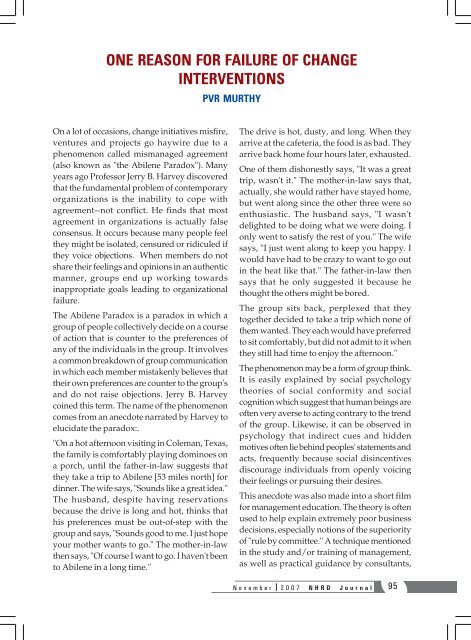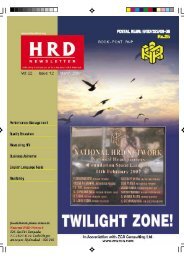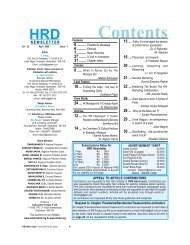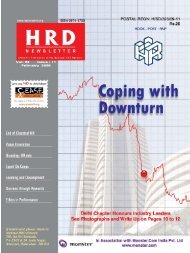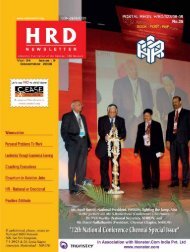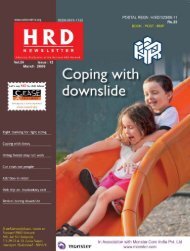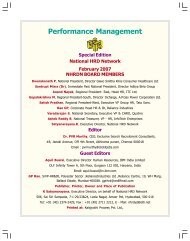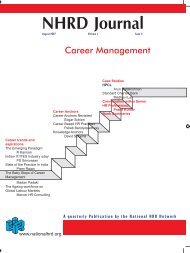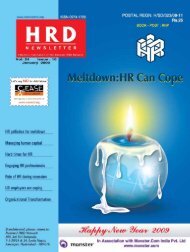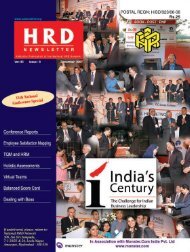NHRD Journal - National HRD Network
NHRD Journal - National HRD Network
NHRD Journal - National HRD Network
Create successful ePaper yourself
Turn your PDF publications into a flip-book with our unique Google optimized e-Paper software.
ONE REASON FOR FAILURE OF CHANGE<br />
INTERVENTIONS<br />
PVR MURTHY<br />
On a lot of occasions, change initiatives misfire,<br />
ventures and projects go haywire due to a<br />
phenomenon called mismanaged agreement<br />
(also known as "the Abilene Paradox"). Many<br />
years ago Professor Jerry B. Harvey discovered<br />
that the fundamental problem of contemporary<br />
organizations is the inability to cope with<br />
agreement--not conflict. He finds that most<br />
agreement in organizations is actually false<br />
consensus. It occurs because many people feel<br />
they might be isolated, censured or ridiculed if<br />
they voice objections. When members do not<br />
share their feelings and opinions in an authentic<br />
manner, groups end up working towards<br />
inappropriate goals leading to organizational<br />
failure.<br />
The Abilene Paradox is a paradox in which a<br />
group of people collectively decide on a course<br />
of action that is counter to the preferences of<br />
any of the individuals in the group. It involves<br />
a common breakdown of group communication<br />
in which each member mistakenly believes that<br />
their own preferences are counter to the group's<br />
and do not raise objections. Jerry B. Harvey<br />
coined this term. The name of the phenomenon<br />
comes from an anecdote narrated by Harvey to<br />
elucidate the paradox:.<br />
"On a hot afternoon visiting in Coleman, Texas,<br />
the family is comfortably playing dominoes on<br />
a porch, until the father-in-law suggests that<br />
they take a trip to Abilene [53 miles north] for<br />
dinner. The wife says, "Sounds like a great idea."<br />
The husband, despite having reservations<br />
because the drive is long and hot, thinks that<br />
his preferences must be out-of-step with the<br />
group and says, "Sounds good to me. I just hope<br />
your mother wants to go." The mother-in-law<br />
then says, "Of course I want to go. I haven't been<br />
to Abilene in a long time."<br />
The drive is hot, dusty, and long. When they<br />
arrive at the cafeteria, the food is as bad. They<br />
arrive back home four hours later, exhausted.<br />
One of them dishonestly says, "It was a great<br />
trip, wasn't it." The mother-in-law says that,<br />
actually, she would rather have stayed home,<br />
but went along since the other three were so<br />
enthusiastic. The husband says, "I wasn't<br />
delighted to be doing what we were doing. I<br />
only went to satisfy the rest of you." The wife<br />
says, "I just went along to keep you happy. I<br />
would have had to be crazy to want to go out<br />
in the heat like that." The father-in-law then<br />
says that he only suggested it because he<br />
thought the others might be bored.<br />
The group sits back, perplexed that they<br />
together decided to take a trip which none of<br />
them wanted. They each would have preferred<br />
to sit comfortably, but did not admit to it when<br />
they still had time to enjoy the afternoon."<br />
The phenomenon may be a form of group think.<br />
It is easily explained by social psychology<br />
theories of social conformity and social<br />
cognition which suggest that human beings are<br />
often very averse to acting contrary to the trend<br />
of the group. Likewise, it can be observed in<br />
psychology that indirect cues and hidden<br />
motives often lie behind peoples' statements and<br />
acts, frequently because social disincentives<br />
discourage individuals from openly voicing<br />
their feelings or pursuing their desires.<br />
This anecdote was also made into a short film<br />
for management education. The theory is often<br />
used to help explain extremely poor business<br />
decisions, especially notions of the superiority<br />
of "rule by committee." A technique mentioned<br />
in the study and/or training of management,<br />
as well as practical guidance by consultants,<br />
November 2007 <strong>N<strong>HRD</strong></strong> <strong>Journal</strong> 95


